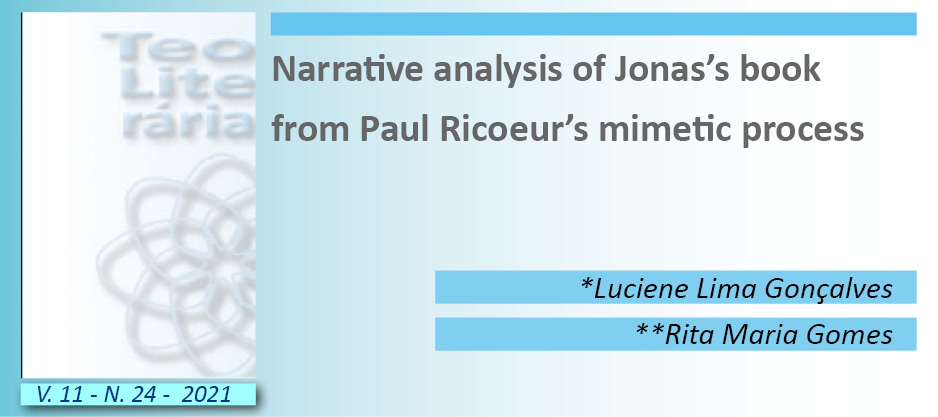Narrative analysis of Jonas’s book from Paul Ricoeur’s mimetic process
DOI:
https://doi.org/10.23925/2236-9937.2021v24p609-626Keywords:
Mimesis, Paul Ricoeur, Jonas, Israel, ReaderAbstract
In this article the book of Jonas is approached, by the narrative method, using the mimetic process of Paul Ricoeur, from the triple mimesis: prefiguration, configuration and refiguration. The purpose of this article is to highlight the importance of this type of approach for illuminating a specific character of Jonas’ text that is obscured in most of the reflections elaborated on this book: that of manifesto literature. For this, Jonas’s text is analyzed considering its four chapters, which correspond to narrative frames, mainly through refiguration, that is, through the reader’s eyes. Thus, it is concluded that this method favors the understanding of the book both in its condition of literature and its theology.
References
ABADIE, Philippe. El libro de Esdras y de Nehemías. Estella: Verbo Divino, 1998 (Cuadernos Bíblicos).
BROWN, Raymond; FITZMEYER, Joseph; MURPH, Roland. E. Comentário
bíblico San Jerónimo. Ediciones Cristiandad: Madrid, 1971. II Tomo.
CARNEIRO, Jose Vanderlei. Por uma redefinição da narrativa à luz da narratologia contemporânea.Fortaleza, 2009, 166f. Tese de doutorado (Doutorado em Linguística) Universidade Federal do Ceará, 2009.
MARGUERAT, Daniel; BOURQUIN, Yvan. Para ler as narrativas bíblicas: iniciação a análise narrativa. São Paulo: Loyola, 2009.
MORA, Vincent. Jónas.Estella: Verbo Divino, 1981 (Cuadernos Bíblicos).
RICOEUR, Paul. A hermenêutica bíblica. São Paulo: Loyola, 2006.
RICOEUR, Paul. Tempo e narrativa. Tomo I. São Paulo: Papirus, 1994.
RICOEUR, Paul. Tempo e narrativa. Tomo III. São Paulo: Papirus, 1997.
SCHOKEL, Luis Alonso; SICRE DIAZ, José Luis. Profetas II. Madrid: Ediciones de Cristiandad. 1980.

Published
How to Cite
Issue
Section
License
Copyright (c) 2021 Teoliteraria - Journal of Literatures and Theologies (On Line) ISSN 2236-9937

This work is licensed under a Creative Commons Attribution 4.0 International License.
TeoLiteraria – Journal of Literatures and Theologies owns the copyright of all published material. The whole reproduction of the articles of this Journal in other publications or for any other purpose, by any means, requires a written permission of the editor of this journal. Partial reproductions of articles (abstracts, more than 500 words text, tables, figures and other illustrations) must have a permission written by the publisher and the authors.
